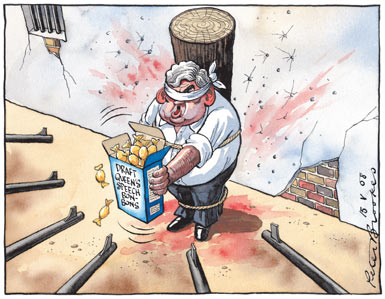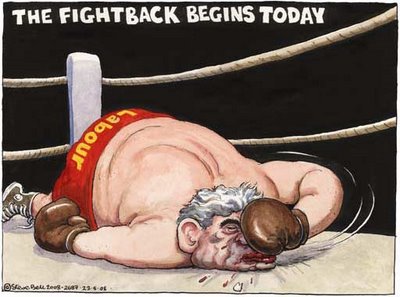 Just when it doesn't seem that it can get any worse for Labour and Gordon Brown, out comes another a new poll that shows that the collapse in support for the party is continuing. The latest Guardian/ICM poll puts Labour's support at 27%: the lowest since the the poll series began back in 1984, with the Tories in front by 14 points, at 41%. Although it seems unlikely that would be the outcome at the general election, as Labour surely can't go any lower, it still suggests that the days of hoping for that almost mythical hung parliament may well be over: a result on this scale will gave the Tories a landslide akin to that of Labour's in 97. The country has also firmly turned on Brown, with 51% ranking John Major as a better prime minister, with 67% saying the same of Blair.
Just when it doesn't seem that it can get any worse for Labour and Gordon Brown, out comes another a new poll that shows that the collapse in support for the party is continuing. The latest Guardian/ICM poll puts Labour's support at 27%: the lowest since the the poll series began back in 1984, with the Tories in front by 14 points, at 41%. Although it seems unlikely that would be the outcome at the general election, as Labour surely can't go any lower, it still suggests that the days of hoping for that almost mythical hung parliament may well be over: a result on this scale will gave the Tories a landslide akin to that of Labour's in 97. The country has also firmly turned on Brown, with 51% ranking John Major as a better prime minister, with 67% saying the same of Blair.
Some of that must surely be directly related to probably temporary anger about the 10p rate, or the listlessness consuming the government as the Tories look increasingly confident and like they're enjoying themselves for the first time in years. Osborne's response to last week's mini-budget was pure posturing without any real answer, but Cameron's skill at the dispatch box cannot be denied, running rings round Brown, the man who previously smacked down a succession of shadow chancellors, now apparently bereft of any answer other than to repeat the same old "achievements" with promises of how he'll lead us through the economic storm.
It's little wonder this is the case when the best thinking inside the mainstream Labour party is by Peter Hain, who's managed to work out that the party has to appeal to both Labour's "core" and to the "aspirational", rather than either one or the other. The problem is that Labour at the moment is appealing to neither, and has no apparent idea of how to do it. Hain's main points are about how to win back support in Wales, where the party was decimated in the local elections. The answers to that ought to be obvious, based on the reading of the results. Rather than going to the Conservatives, the Labour support either stayed at home, turned to the nationalists, Plaid Cymru, or to left-wing independents that may once have been associated with Labour. They didn't go because Labour wasn't speaking to the "aspirational" among them; they went because they stopped talking to them entirely, taking them for granted just as Hain's former colleagues in the cabinet have for the last 10 years. The 10p rate was the final straw.
What we're using here is euphemisms. It no longer seems politically-correct to refer to the "core" vote as working-class, or to the so-called "aspirational" as the middle classes, because that's what they are, and if anything, the euphemisms are far more patronising than the former labels. Equally meaningless is "progressive", which really deserves to be consigned to the dustbin of history. When both Hillary Clinton and David Cameron call themselves "progressive", when neither are in the slightest what was once meant by the term, it's time to abandon it. It's partly because the old terms have become insults, when they shouldn't have. The Sun and others disparagingly decry "Lefties", while some of us who consider ourselves lefties consider "right-wing" to mean much the same. Also guilty are the third-way proselytisers, who tried to tell us that right and left were obsolete, purely because they themselves didn't believe in either but in reality tended to be to the right of what the rest of us still understood as the political spectrum.
I raise these issues because they seem especially pertinent when considering the by-election campaign in Crewe and Cameron's claim for the Tories to be the true new progressives. Despite such revolting apologia from Hopi Sen and others of the usual suspects, the Labour campaign, if it can be called that, targeting the Tory candidate Edward Timpson as a "toff", hounding him with young activists dressed up in tails and top hats, is a sign of the sheer desperation and political bankruptcy of the party in 2008. We might all still quite rightly be obsessed with class in 2008, but to openly and cravenly use your opponent's wealth and upbringing as the main reason for why he shouldn't represent a working-class constituency is to admit that you have nothing else to say or, that if you tried, you'd be haplessly beset by the fact that your arguments would count for nought. It's all well and good to cry that they've done it before or are still doing it, but that's the equivalent of the child excusing his behaviour by saying his friend did it first. The child description is perhaps apt: the Labour smearing and leaflets attacking "Tory-boy Timpson" for his mansion and opposition to foreign workers getting ID cards is petulant and juvenile. The starting point for the Labour fightback ought to have been Cameron's appearance there last week, when he was filmed prevaricating weakly in front of a real person who asked what he would do about the 10p rate. They could say that Labour has now mostly fixed it, and that what the rest of Cameron and the gang are offering is the same old Thatcherism wrapped up in a kinder face, as epitomised by his speech on the economy today.
The reason why even that though would be next to impossible though is because it does almost seem as if history is repeating. After Blair became Labour leader after the death of John Smith, he spent the best part of the two years before campaigning for the election began to come across much as Cameron has, as the caring, different new generation of politician prepared to listen, having what Jon Cruddas has referred to as "emotional literacy". This means talking about Britain's "broken society" in much the same way as Labour might have done if out of power, but adding in the same old dog whistles of family breakdown which can be cured if you bribe the middle classes, use of the voluntary sector rather than the state, and believing in society, it's just not the same thing as the state, as if anyone ever said it was. The harsher side of the rhetoric however doesn't filter through: just the vacuousness does. New Labour offered the "new realities and the new paradigm" with the face of Blairism, far kinder than the old nasty Conservatives who said what they meant. Cameron has learned this is the way to do it now, except his vision is to the right of Blair's version.
That's what's so perplexing about the political environment at the moment. We've only just gotten rid of Blair and all he stood for, yet the public apparently wants his heir apparent rather than strange fusty old Gordon. There's no doubt that the public have not yet embraced the Conservatives; what they have embraced is change. Brown hasn't been enough of a change, yet Cameron is no change at all except in the aesthetic department. There's still the best part of two years for this to fully pan out, but if the Conservatives don't win Crewe on Thursday then it will be astonishing. The question will then be whether Brown can survive any further setbacks: at the moment there is no obvious alternative, but defeat in Crewe will only bring the spectre of defeat ever closer, and we all know what they can entail. The sad fact may well be that Labour is already doomed, but it no longer seems impossible that it won't be Brown who'll lead them into that dark night.Labels: "emotional literacy", Conservatives, Crewe by-election, David Cameron, death of Labour, euphemisms, Gordon Brown, opinion polls, Peter Hain, politics




